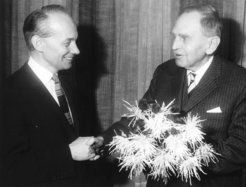50 years a Nobel Laureate
On the morning of October 30, 1967, Manfred Eigen was in his office at the Göttingen MPI for Physical Chemistry in Bunsenstraße when he received an unusual phone call: A Swedish camera team was on the line, asking for an interview that very same day. In answer to his question as to how the camera team intended to get from Sweden to Göttingen so quickly, the Max Planck researcher heard in amazement: “We are already here in Göttingen.” He agreed to the request.
An hour or so later, Manfred Eigen was officially announced as one of that year’s recipients of the Nobel Prize in Chemistry. Among the first people to congratulate him was Otto Hahn. The German Post Office finally inquired in desperation if it would be all right to deliver all telegrams addressed to Eigen together in one batch. The enormous number of requests for interviews and congratulations from all over the world also meant that he was unable to do any work at all in the weeks following the announcement until the award ceremony, as Eigen recalled.
Large gap in our knowledge about chemistry filled

On December 10, 1967, Manfred Eigen and his British colleagues Ronald Norrish and George Porter, received their Nobel Prizes from King Gustav VI Adolf of Sweden. The Royal Swedish Academy of Sciences therewith honored Eigen’s success in following the progress of very rapid chemical reactions with an unprecedented time resolution extending down to micro- and even nanoseconds. He had thus overcome a fundamental barrier, inasmuch as such very rapid reaction processes had previously been considered to be immeasurable. His so-called relaxation measurement methods solved important questions in biochemistry and are still of fundamental importance way beyond the confines of chemistry.
“Although chemists had long been talking of instantaneous reactions, they had no way of determining the actual reaction rates. There were many very important reactions of this type, such as neutralization. It is thanks to you, Professor Manfred Eigen, that chemists now have a whole range of methods that can be used to follow these rapid processes, so that a large gap in our knowledge about chemistry has now been filled,” acknowledged H.A. Ölander, a member of the Nobel Committee for Chemistry of the Royal Swedish Academy of Sciences, in his tribute to the work of the Göttingen-based researcher. During the course of the festivities that evening, Eigen had a lively discussion about science with the King – a respected archaeologist and an authority on Chinese art.
A Nobel Prize for each generation of researchers

To Manfred Eigen’s great delight, this was not the only Nobel Prize to be awarded for research work at his institute. This prestigious award was also bestowed on scientists of the next two generations at the MPI for Biophysical Chemistry. Erwin Neher and Bert Sakmann were awarded the 1991 Nobel Prize in Physiology or Medicine, and Stefan Hell was a recipient of the Nobel Prize in Chemistry in 2014. (cr)

